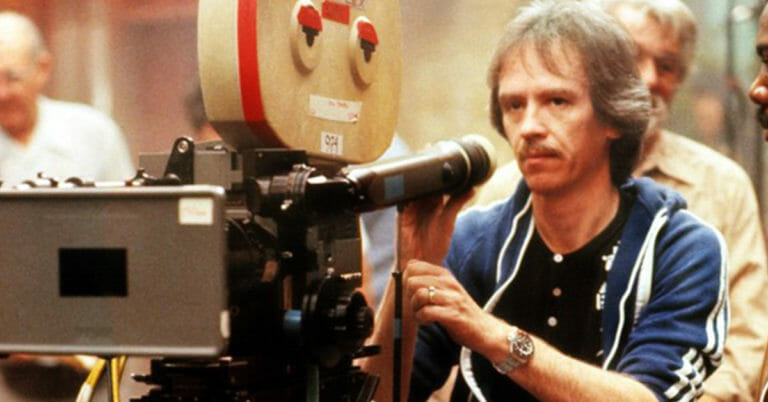By Clare Nina Norelli · March 20, 2018

“The score just had to serve the film. You have to make the score sound like the film as much as humanly possible.” – John Carpenter
There are many directors who do not limit themselves to just directing their films. Sometimes, they also write their film’s screenplay, involve themselves in editing and cinematography, and may even appear as a character on screen. But not so common is the director who also scores. John Carpenter, who turned 70 earlier this year, has had a long, distinguished cinematic career, most notably in the horror genre, and since his early student films of the late 1960s, he has contributed scores to the vast majority of his projects. The minimalist, synth-heavy music he has composed for his films have proven incredibly influential (just listen to the Stranger Things theme for one) and taken on a cult status, so much so that Carpenter seems to have turned his attention away from film and more towards creating and performing his music in recent years. After the release of two well-received records on the Sacred Bones Records label—Lost Themes (2015), Lost Themes II (2016)—he toured with his band through the US and Europe, and at the end of 2017 released Anthology: Movie Themes 1974-1998, a collection of newly-recorded themes from his career as a film composer.
Here are five of the best that are included on his latest release.
For his second feature, the low-budget independent thriller Assault on Precinct 13, Carpenter wrote the film’s entire score in a matter of days. His main theme was inspired by Led Zeppelin’s “Immigrant Song,” and the song’s influence can be heard in the rhythm of the repetitive third intervals of the theme’s bassline. Dramatic synthesized strings come in around the 40-second mark, and along with the feeling of restlessness created through the repetitive bassline, the theme sets up our anticipation of the siege that will soon play out onscreen.
A lone, urgent piano motif emerges from the darkness atop an unabating electronic rhythm, all in destabilizing 5/4 time. A pumpkin head is shown onscreen and an ominous three-note motif comes with it, representative of Michael Myers, the monstrous, featureless figure who terrorizes Laurie and her friends in the film. Initially, Halloween had been showed to a studio executive without music, and after a lukewarm response, Carpenter realized he’d have to save the film with his music. His theme for Halloween immediately establishes a mood of dread, and it is perhaps his most beloved and influential composition, a masterpiece of horror scoring.
Is there anything quite as immediately unnerving as the sound of an immense pipe organ playing a series of minor chords? Carpenter begins his theme for the nautical horror film The Fog with this gothic orchestration choice (albeit synthesized, of course), leading into a more subdued, but nonetheless creepy repetitive piano motif that is reminiscent of his theme from Halloween.
Carpenter’s theme for Christine features an aggressive beat paired with eerie electronica that shimmers fearfully. It’s a curious mix, but as we soon learn, an apt one. In the film, the titular Christine is a demonic muscle car involved in a codependent relationship with its new owner, Arnie, who has begun to undergo a complete character overhaul since acquiring the car. Christine is lethally loyal, stalking and killing those who bother Arnie or come between the pair, and the car’s hostile nature is embodied in the relentless pounding of Carpenter’s theme.
Inspired by Metallica’s Black Album whilst conceiving the film, Carpenter had envisioned “Enter Sandman” as In the Mouth of Madness’s opening music but was unable to secure the rights. Undiscouraged, Carpenter did the next best thing and composed (with Jim Lang) his own take on the metal masterpiece, enlisting Dave Davies of the Kinks to contribute the theme’s dramatic, howling guitar riff.
 Clare Nina Norelli is a composer, musician, teacher and writer. She currently writes Scores on Screen, a column on film music for MUBI’s Notebook and in February of 2017 her first book Soundtrack from Twin Peaks was published as part of Bloomsbury’s 33 1/3 series. You can follow her on twitter @clarenorelli.
Clare Nina Norelli is a composer, musician, teacher and writer. She currently writes Scores on Screen, a column on film music for MUBI’s Notebook and in February of 2017 her first book Soundtrack from Twin Peaks was published as part of Bloomsbury’s 33 1/3 series. You can follow her on twitter @clarenorelli.
For all the latest from The Script Lab, be sure to follow us on Twitter, Facebook, and Instagram.